Casein protein is derived from milk, like whey, and is a complete protein known for its slow digestion, which takes several hours to absorb fully. This slow digestion rate may help support muscle growth during long periods without food, like overnight, and it may help manage hunger during weight loss. (1) Additionally, many casein-rich foods are high in calcium, supporting bone health. (2)
Most dairy foods will give you a healthy dose of this protein, with dairy milk, for example, providing about 80% casein and 20% whey. Casein protein powders can also be a convenient way to maximize your intake within a specific diet plan. So which one is best to get you to your goals? Our team of dietitians and fitness experts did a deep dive into some of the best protein powders. We evaluated ingredient quality, safety, value, taste, customer satisfaction, and more. Using these insights, we compiled the following list of best casein protein powders to help you decide what might work best for you.
Editor’s choice: Legion Casein+
Legion Casein+ stands out as our editor’s choice due to its well-rounded nutritional profile and high-quality sourcing. Here’s why we think it’s a top pick:
- Delivers 25 grams of micellar casein protein per serving to support muscle recovery.
- Provides 60% of the daily value of calcium in just 110 calories, making it a great option for bone health.
- It’s soy-free, sugar-free, and gluten-free, catering to a variety of dietary needs.
- Legion uses Truly Grass Fed® cows, ensuring clean-label ingredients and strong animal welfare standards.
Medical disclaimer: This article is intended for educational and informational purposes only. It is not intended as a substitute for medical advice. For health advice, contact a licensed healthcare provider.
Our picks for the best casein protein powder
- Best natural: Legion Casein+
- Best tasting: Transparent Labs 100% Grass Fed Casein
- Best for muscle gain: Nutricost Vanilla Casein 5lb
- Best unflavored: Promix Unflavored Casein 5lb
- Best whey and casein: Optimum Nutrition Platinum Rebuild
How to choose the best casein protein powder for you
Nutrition profile
When choosing a casein protein powder, focus on more than just total protein content. Check the calories, sugar, fat, and carbohydrate content to ensure the slow-digesting formula fits into your daily nutrition goals, especially if you’re using it as a nighttime supplement.
Ingredient quality
Opt for casein products that fully disclose their ingredients. Look for minimal additives, and avoid those with unnecessary fillers or artificial components that might cause digestive issues or reactions.
Third-party testing
Ensure your casein protein is third-party tested for potency and purity. This is the only way to know for sure that what is on the label is what you’re getting, and nothing else.
Taste and cost
Make sure you pick a flavor you enjoy and a product that fits your budget for long-term use. Consistency is key to reaping the benefits of this slow-releasing protein.
Compare casein protein powders
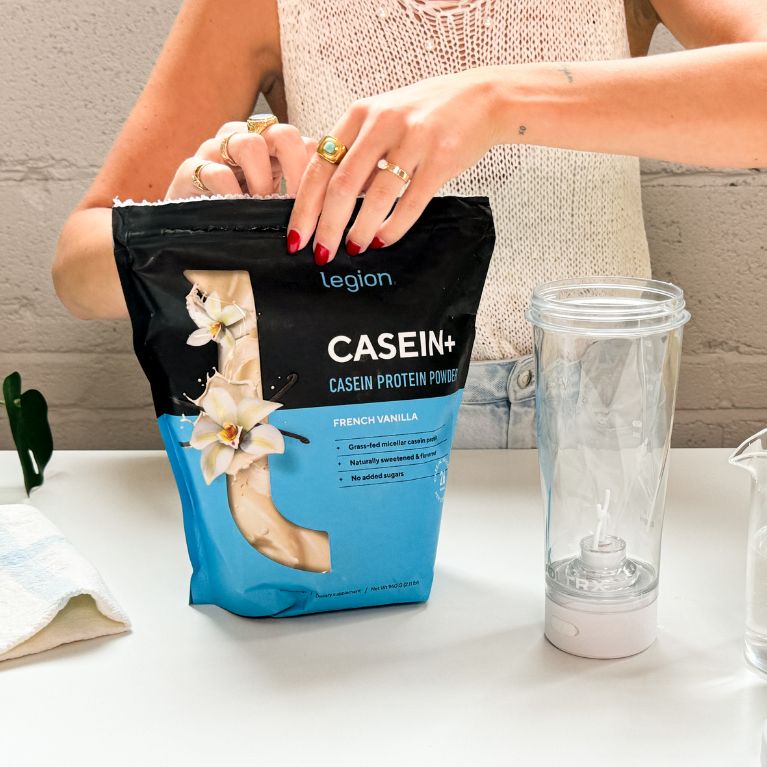
|
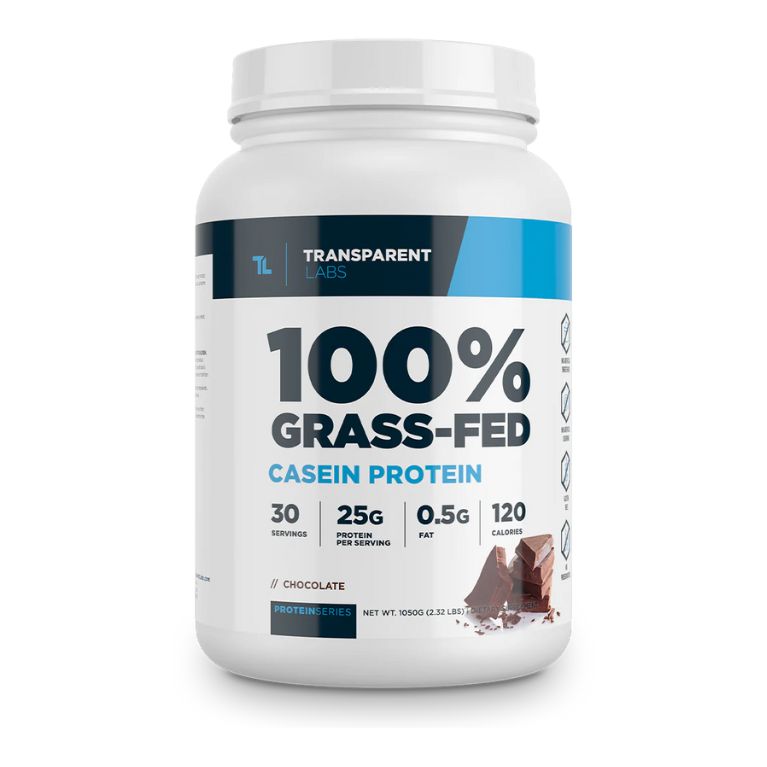
|
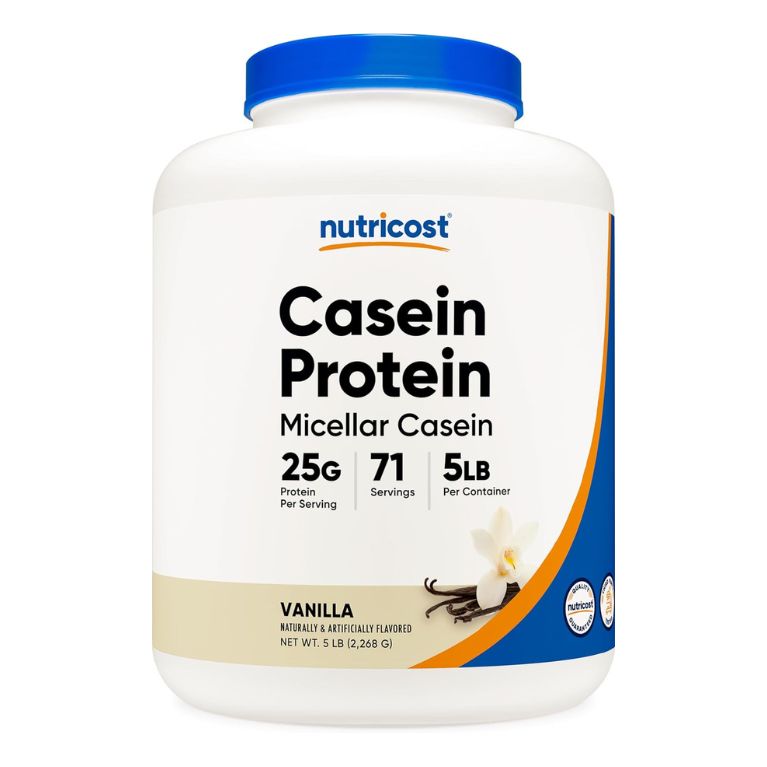
|
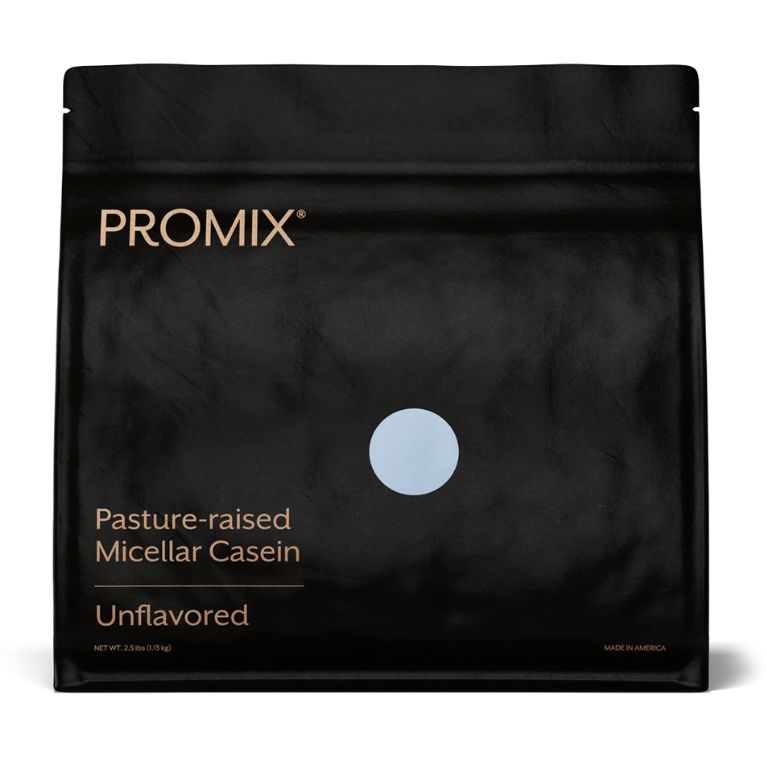
|
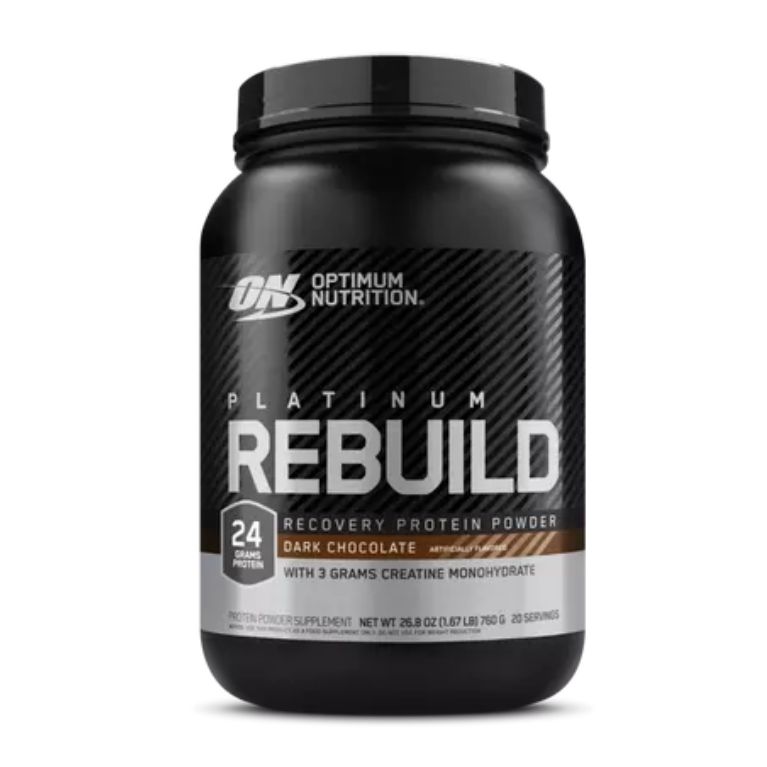
|
|
| Legion Casein+ | Transparent Labs 100% Grass Fed Casein | Nutricost Vanilla Casein 5lb | Promix Unflavored Casein 5lb | Optimum Nutrition Platinum Rebuild | |
| Rating | |||||
| Cost per serving | $2.00 | $2.00 | $0.94 | $1.14 | $3.00 |
| Serving size | 1 scoop (34 grams) | 1 scoop (35 grams) | 1 scoop (32 grams) | 2 scoops (29 grams) | 1 scoop (38g) |
| Protein per serving | 25 grams | 25 grams | 24 grams | 25 grams | 24 grams |
Best Natural Casein Protein Powder: Legion Casein+


Key product features
What you should know
Legion Casein+ provides a well-rounded nutrition profile in a clean-label formula. Four flavors are available, helping to add variety to your supplement routine. Plus, third-party testing is conducted to provide peace of mind that you’re getting quality ingredients.
- Our testers reported that Legion Casein+ has a thick texture with a chalky aftertaste that requires getting used to. It also contains stevia, which some people may not like.
- At $2 per serving, this costs more than the average casein powder. However, the company provides a generous 100% money-back guarantee for any reason.
- This is a great option for people who may have sensitivities or allergies; it’s sugar-free, gluten-free, and non-GMO project-verified.
- Legion’s casein is sourced from Truly Grass Fed ® cows that spend at least 95% of the year grazing outside.
Best tasting casein protein powder: Transparent Labs 100% Grass Fed Casein
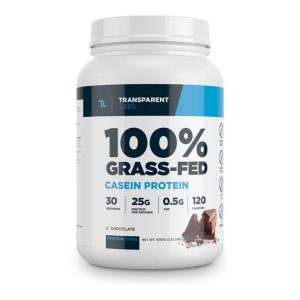

Key product features
What you should know
Transparent Labs provides 25 grams of 100% grass-fed micellar protein for just 120 calories per serving. With rich chocolate flavor and a healthy dose of calcium, Transparent Labs is an excellent choice, but you’ll want to be aware it contains a fair amount of sodium at 300 milligrams per serving.
- Our testers loved the taste and think this product is especially well-suited for making high-protein pudding and ice cream. However it does take some effort to mix fully.
- At $2 per serving, Transparent Labs’ casein is expensive compared to other products on the market.
- This is great for chocolate lovers who want a versatile product they can look forward to eating.
Best casein protein powder for muscle gain: Nutricost Vanilla Casein 5lb
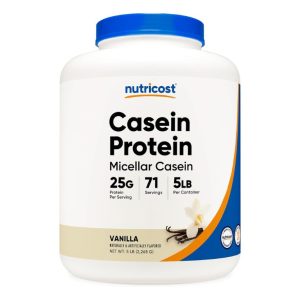

Key product features
What you should know
Nutricost offers 24 grams of micellar casein at about half the cost of comparable products, making it a more affordable option for those needing multiple servings to meet higher protein targets for muscle gains.
- While this casein has an unmistakeably gritty texture, it mixes well with milk and is versatile enough to use in baked goods. These work arounds easily mask that texture issue.
- At $0.94 per serving, this is one of the most cost-effective casein options on the market.
- Nutricost’s casein is best for people who are actively trying to build muscle mass, as it provides an affordable way to boost their protein intake.
Best unflavored casein protein powder: Promix Unflavored Micellar Casein Protein Powder
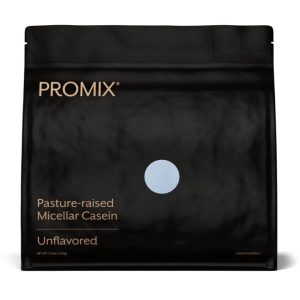

Key product features
What you should know
Promix unflavored casein provides 25 grams of grass-fed micellar casein per serving with no artificial additives, chemical aftertaste, or non-calorie sweetness. Its simple formula delivers excellent nutrition, while its versatility and convenience make it an ideal choice for various uses.
- This product works great in smoothies, pancakes, and oatmeal, but doesn’t dissolve well in plain milk or water.
- At $1.14 per serving, this is fairly affordable compared to competitors on the market.
- It is best for people who want to avoid unnecessary additives and enjoy the flexibility of adding protein to more than just a shake.
- Promix’s casein has the lowest calorie and sodium content out of all the products on our list, with just 105 calories and 45 milligrams of sodium per serving.
Best whey and casein protein powder: Optimum Nutrition Platinum Rebuild
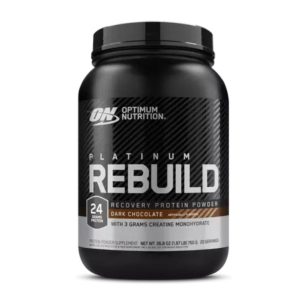

Key product features
What you should know
Optimum Nutrition Platinum Rebuild is designed to help serious athletes reach their performance goals. It combines fast-acting whey protein with slow-digesting casein to cover all the bases for muscle growth and recovery. Creatine and glutamine are also included to help amplify these results.
- Optimum Nutrition is known for its great-tasting products. This new formula is available in two flavors: dark chocolate and vanilla buttercream.
- At $3 per serving, this is a premium-priced product. It’s more expensive than most competitors on the market.
- This casein protein powder is best for athletes and fitness enthusiasts looking to reach new performance goals.
How we score the best casein protein powders
Finding the right supplement that meets health goals and delivers on promised claims requires time and research. On top of that, you need to consider product safety and price.
Dedicated to helping you find the best protein powder for muscle gain, we do the leg work for you. Our team tested, evaluated, and fact-checked dozens of protein powders on the market, including over 30 casein protein powders, taking many key factors into consideration, including effectiveness, quality, safety, and price, looking for supplements that rank high in several key areas to create our list of recommendations. Learn more about our whey protein powder scoring methodology and plant-based protein powder methodology here.
We used the following criteria to score each protein powder:
Protein source—40%
The protein source is important because it affects the product’s digestibility, nutrient profile, and environmental impact. We consider the origin of the protein to ensure it meets vegan standards and provides a high-quality, sustainable option.
Here’s what we look for:
- Whey
- Casein
- Soy
- Pea
- Brown rice
- Hemp
- Lentil
- Chia
- Pumpkin Seed
- Blend
Complete protein—20%
Whether the protein is complete is crucial for determining if it provides all nine essential amino acids needed for muscle repair and overall health. We consider this to ensure that the product can serve as a reliable, sole protein source without requiring additional supplementation.
Macronutrient calories per serving—15%
The balance of macronutrients per serving is important for managing energy levels, weight, and overall nutrition. We consider these calories to evaluate if the product supports specific dietary goals, such as high-protein or low-carb diets.
Our factors in this rating include:
- Calories from protein
- Calories from carbs
- Calories from fats
Total protein per serving—15%
The amount of protein per serving is a key factor in determining the product’s effectiveness in meeting daily protein needs.
Our factors in this rating include:
- 20 grams of protein or less per serving
- 21 to 30 grams of protein per serving
- Over 30 grams of protein per serving
Price per gram of protein—5%
Understanding the cost efficiency is important for those who want to manage their budget while meeting their nutritional needs. We consider the price per gram of protein to compare the value of different products.
These are the ranges we consider:
- $0.30 to $0.50 per gram
- $0.60 to $0.80 per gram
- $0.90+ per gram
Sweeteners—5%
Sweeteners play a significant role in the taste, caloric content, and health impact of the product. We consider the type and amount of sweeteners used to evaluate their impact on flavor, their suitability for low-sugar diets, and any potential health implications.
Here are the common ones we evaluate:
- Sugar
- Dextrose
- Honey, agave
- Stevia
- Maltodextrin
- Erythritol
- Monk fruit
- Sucralose
- Aspartame
- Xylitol, acesulfame
Benefits of casein protein powder
Getting enough protein is important for overall health. According to the Recommended Daily Allowance (RDA), most people need a minimum of 0.8 grams of protein per kilogram of body weight daily, which equates to about 65 grams of protein daily for a 180-pound person. (7)
However, recent research indicates that more protein may be needed to optimize health. A 2019 review suggests 1.2 to 2.0 grams of protein daily per kilogram of body weight supports athletic performance, weight management, and muscle maintenance during aging. This equals 98 to 163 grams per day for the same 180-pound person. (8)
Protein powders offer a convenient way to increase your protein intake, and casein protein powders offer specific advantages. The following are a few that stand out:
Helps with muscle growth and recovery
To build and maintain muscle, your body needs to grow more muscle than it breaks down. Tough workouts, weight loss, aging, or illness can cause muscle breakdown. Eating enough protein helps repair and build muscles, keeping this balance in check. (8)
Casein is a high-quality protein powder choice because it contains all nine essential amino acids, including branched-chain amino acids crucial for muscle building. Unlike whey protein, which acts fast, casein’s slow digestion releases amino acids steadily into the bloodstream. (1)
This slow digestion ensures your muscles receive protein for up to six hours, helping to prevent muscle breakdown and safeguard muscle mass, especially during periods of fasting such as sleep. (1) For this reason, people often take it before bed to aid with overnight muscle recovery.
Research backs this up. A 2021 review showed that taking 20 to 40 grams of casein 30 minutes before bed increased overall protein production in young and elderly men overnight. Similarly, a 2020 review found that consuming at least 40 grams of casein before bed enhances muscle recovery and performance the next day. However, more research is needed to solidify these findings. (14, 1)
Aids with hunger management
Due to its slow digestion, casein might be especially good at managing hunger, but studies are mixed. (15)
While it’s unclear if casein is better than other proteins for hunger control, high-quality proteins like casein are known to reduce hunger, the desire to eat, and hunger-stimulating hormones. Therefore, incorporating casein into your diet can contribute to overall satiety and better appetite management. (16)
Supports bone health
Protein intakes above the RDA of 0.8 grams per kilogram of body weight per day from any source may help reduce bone density losses and the risk of features, particularly in older adults. (17)
Casein protein powders can be rich in calcium, further supporting bone health. (2)
Who should use casein protein powder?
Casein protein is a good choice for anyone looking to build muscle mass or increase their overall protein intake; however, it may be ideal for specific groups of people.
Due to its slow and steady release of amino acids, it may be particularly helpful to people who work out in the evening and want to promote muscle recovery overnight or who have multiple training sessions throughout the day and want a steady supply of essential amino acids.
Additionally, casein may be helpful for people who need to manage their hunger during weight loss or between long periods of eating because of scheduling demands or intermittent fasting diets. Its slow digestion may help you feel fuller longer.
If you’re looking for a protein powder to keep you full during your weight loss journey, check out our best protein powders for weight loss.
Dosages for casein protein powder
A high-quality casein protein powder should contain at least 20 grams of protein per serving, if not more. The International Society of Sports Nutrition recommends that active individuals should supplement with 20-40 grams of protein, up to every three to four hours. (18) Some research has shown that a casein protein powder dose of 40 grams taken 30 minutes before bedtime may be beneficial in helping with muscle recovery. (1)
Potential side effects of casein protein powder
Casein protein powder may not be well tolerated by some individuals and may cause gastrointestinal side effects such as gas, bloating, and stomach pain. People who are allergic to dairy should not consume casein protein powder since it is derived from milk and would cause an allergic reaction.
How much does casein protein powder cost?
Typically, a two-pound container of casein protein powder with 30 servings costs around $50 to $60. The average cost of the casein protein powders featured in our list is $1.68 per serving. The cheapest casein protein powder featured here costs $0.94 per serving, while the most expensive costs $3.00 per serving. The cost of a casein protein powder can depend on the brand and quality of ingredients.
FAQs
What’s the best casein protein on the market?
Micellar casein is the least processed version of casein and, therefore, more likely to maintain casein’s slow-digesting benefits, though research is ongoing in this area. (3, 4) According to our team of experts, Legion Casein+ is the best casein protein powder on the market.
How much casein protein powder should I take?
One to two scoops, or 20 to 40 grams, after a workout or before bed for muscle recovery is typical. However, your ideal dose will depend on your health and fitness goals. Make sure you’re getting a variety of different proteins in your diet, and speak with your doctor about how much protein you need.
Who should not take casein protein powder?
Casein protein powders are not a good choice for anyone with dairy allergies or for people looking for a vegan protein powder. Additionally, certain casein supplements may not align with Kosher or Halal diets.
Which is better: casein or whey protein?
Both casein and whey are quality options for increasing protein intake. Each supplies the nine essential amino acids your body requires. However, they serve different roles in your fitness regimen.
Whey is fast digesting, spiking amino acid levels quicker and higher than casein. It also contains more leucine, which triggers muscle building. (19) For this reason, it may be best used immediately post-workout to replenish fatigued muscles.
On the other hand, casein digests more slowly, providing a steady protein supply to muscles, which helps protect against breakdown and can aid in managing hunger. Due to its gradual release, it’s best suited for periods of fasting, such as overnight or during calorie-restricted diets. (11)
What is the best time to take casein protein?
Casein can be taken anytime, but research suggests taking it 30 minutes before bed can provide muscle health benefits overnight.
Is casein protein powder safe?
Yes, casein protein powder is generally safe, unless you are allergic to dairy. Those who are not allergic to dairy may still experience mild gastrointestinal side effects. But casein protein powder is generally well tolerated by most people. Look for a casein protein powder that is third-party tested and manufactured in a GMP or cGMP certified facility in order to ensure there are no unsafe levels of contaminants, like heavy metals, or banned substances.
These statements have not been evaluated by the Food and Drug Administration. These products are not intended to diagnose, treat, cure, or prevent any diseases.
Our experts
Chris Mohr, Ph.D., RD
Dr. Chris Mohr is an internationally recognized subject matter expert and speaker and performance coach. Through his facilitation and online resources, he works closely with some of the largest corporations in the world including Deloitte, Delta Airlines, Johnson & Johnson and more to help busy executives all over the world, develop the energy to thrive personally and professionally.
Joana Neziri, M.S., NASM CPT
Joana is a writer, editor, and content strategist focusing on nutrition, fitness, and all things health. After earning a master’s degree in business from the University of North Florida, she began a career in research and digital marketing.
Lily Moe
Lily is a Brooklyn-based writer and editor with over seven years of experience in health media. As a former Fitness Coach, Lily’s editorial prowess has largely focused on fitness, nutrition, and weight management. She has also spent a fair share of time in testing labs, analyzing everything from protein powders to yoga mats. Her work has appeared in Verywell Fit, Verywell Mind, Health, and more.
Kelly Uhler
Kelly has a multifaceted background in elder care, health care, and copywriting. She has worked for organizations such as A Place For Mom and Homecare.com, which gave her the opportunity to work closely with families, providing reliable information to help them make informed decisions about their loved one’s health, safety, and quality of life.

Meghan Novoshielski
MS, RDN, Fortune Recommends Nutrition Writer
About Author
Meghan is an expert Registered Dietitian Nutritionist (RDN) with a Master’s degree in Nutrition Science and over 15 years of experience in the nutrition and wellness field. A sought-after health writer, she’s committed to empowering people to lead their healthiest lives by delivering trustworthy, practical, and engaging nutrition content.
References
- Kim J. Pre-sleep casein protein ingestion: new paradigm in post-exercise recovery nutrition. Physical Activity and Nutrition. 2020;24(2):6-10. doi:https://doi.org/10.20463/pan.2020.0009
- National Institutes of Health. Office of Dietary Supplements – Calcium. Nih.gov. Published 2022. https://ods.od.nih.gov/factsheets/Calcium-HealthProfessional/
- Carter BG, Cheng N, Kapoor R, Meletharayil GH, Drake MA. Invited review: Microfiltration-derived casein and whey proteins from milk. Journal of Dairy Science. 2021;104(3). doi:https://doi.org/10.3168/jds.2020-18811
- Loveday SM. Protein digestion and absorption: the influence of food processing. Nutrition Research Reviews. 2022;36(2):1-16. doi:https://doi.org/10.1017/s0954422422000245
- Lenhart A, Chey WD. A Systematic Review of the Effects of Polyols on Gastrointestinal Health and Irritable Bowel Syndrome. Advances in Nutrition. 2017;8(4):587-596. doi:https://doi.org/10.3945/an.117.015560
- Provenza FD, Kronberg SL, Gregorini P. Is Grassfed Meat and Dairy Better for Human and Environmental Health? Frontiers in Nutrition. 2019;6(26). doi:https://doi.org/10.3389/fnut.2019.00026
- National Institutes of Health. Nutrient Recommendations and Databases. ods.od.nih.gov. Published 2011. https://ods.od.nih.gov/HealthInformation/nutrientrecommendations.aspx#dri
- Carbone JW, Pasiakos SM. Dietary protein and muscle mass: Translating science to application and health benefit. Nutrients. 2019;11(5):1136. doi:https://doi.org/10.3390/nu11051136
- Master PBZ, Macedo RCO. Effects of dietary supplementation in sport and exercise: a review of evidence on milk proteins and amino acids. Critical Reviews in Food Science and Nutrition. 2020;61(7):1225-1239. doi:https://doi.org/10.1080/10408398.2020.1756216
- Trommelen J, Weijzen MEG, van Kranenburg J, et al. Casein Protein Processing Strongly Modulates Post-Prandial Plasma Amino Acid Responses In Vivo in Humans. Nutrients. 2020;12(8):2299. doi:https://doi.org/10.3390/nu12082299
- Antonio J, Candow DG, Forbes SC, et al. Common Questions and Misconceptions about Creatine supplementation: What Does the Scientific Evidence Really show? Journal of the International Society of Sports Nutrition. 2021;18(1). https://www.ncbi.nlm.nih.gov/pmc/articles/PMC7871530/
- Coqueiro AY, Rogero MM, Tirapegui J. Glutamine as an Anti-Fatigue Amino Acid in Sports Nutrition. Nutrients. 2019;11(4):863. doi:https://doi.org/10.3390/nu11040863
- Reis CEG, Loureiro LMR, Roschel H, da Costa THM. Effects of pre-sleep Protein Consumption on muscle-related Outcomes — a Systematic Review. Journal of Science and Medicine in Sport. 2020;24(2). doi:https://doi.org/10.1016/j.jsams.2020.07.016
- Bendtsen LQ, Lorenzen JK, Bendsen NT, Rasmussen C, Astrup A. Effect of Dairy Proteins on Appetite, Energy Expenditure, Body Weight, and Composition: a Review of the Evidence from Controlled Clinical Trials. Advances in Nutrition. 2013;4(4):418-438. doi:https://doi.org/10.3945/an.113.003723
- Kohanmoo A, Faghih S, Akhlaghi M. Effect of short- and long-term protein consumption on appetite and appetite-regulating gastrointestinal hormones, a systematic review and meta-analysis of randomized controlled trials. Physiology & Behavior. 2020;226:113123. doi:https://doi.org/10.1016/j.physbeh.2020.113123
- Groenendijk I, den Boeft L, van Loon LJC, de Groot LCPGM. High Versus low Dietary Protein Intake and Bone Health in Older Adults: a Systematic Review and Meta-Analysis. Computational and Structural Biotechnology Journal. 2019;17:1101-1112. doi:https://doi.org/10.1016/j.csbj.2019.07.005
- Jäger, R., Kerksick, C. M., Campbell, B. I., Cribb, P. J., Wells, S. D., Skwiat, T. M., Purpura, M., Ziegenfuss, T. N., Ferrando, A. A., Arent, S. M., Smith-Ryan, A. E., Stout, J. R., Arciero, P. J., Ormsbee, M. J., Taylor, L. W., Wilborn, C. D., Kalman, D. S., Kreider, R. B., Willoughby, D. S., Hoffman, J. R., … Antonio, J. (2017). International Society of Sports Nutrition Position Stand: protein and exercise. Journal of the International Society of Sports Nutrition, 14, 20. https://doi.org/10.1186/s12970-017-0177-8
- Schoenfeld, B. J., & Aragon, A. A. (2018). How much protein can the body use in a single meal for muscle-building? Implications for daily protein distribution. Journal of the International Society of Sports Nutrition, 15, 10. https://doi.org/10.1186/s12970-018-0215-1
